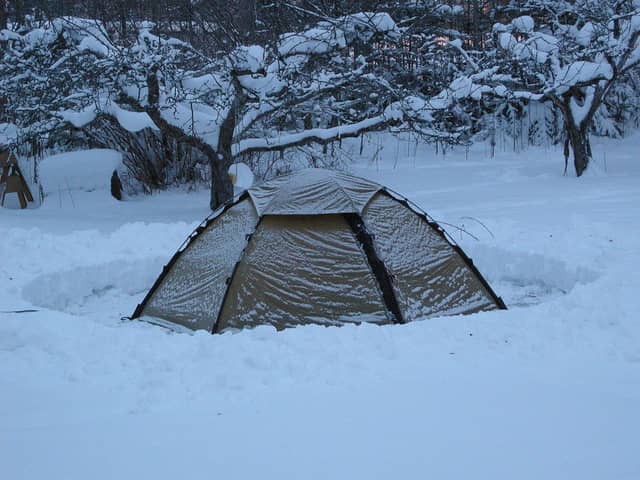How To Stay Warm When Camping in the Winter
Agnieszka Spieszny 09.20.11

Warm summer months draw regular folks out into the woods, to a creek or canyon to sleep underneath the stars warm and comfortable in the North American summer heat. For some, camping should not be limited to days above 65 degrees. If you’re tempted to brave the cold nights and brisk days of fall and winter camping, here are a few tips to stay warm.
A no-brainer; eat and dress warmly. Your body really does need energy from food to keep warm. Eating more than your normal intake won’t hurt for a weekend camping trip and you’ll likely end up using that energy anyway when building a fire, setting up your campsite and hiking.
Cover your limbs. “You can lose 40 to 45 percent of body heat from an unprotected head and even more from the unprotected neck, wrist, and ankles.” US Army Survival Manual, page. 148 (pdf). Other experts credit this 45 percent loss of heat through your head to hypothermia, maintaining that you actually only lose 7 to 10 percent naturally. Either way, covering up limbs is the best option. Use wool, as this fiber can insulate even when wet.
Without a doubt, bring your regular sleeping bag on the trip. Supplement it with an emergency sleeping bag made out of Mylar, the same material as an emergency blanket. Wrap your regular sleeping bag with the emergency Mylar one, or vice versa. The Mylar emergency sleeping bag functions well to keep out a chilling breeze and any water. It’ll retain 80% of your body heat as well. Why not? It’s cheap. The average emergency sleeping bag costs around $5.
Don’t sleep directly on the ground. A sleeping pad underneath your sleeping bag is the best option. Otherwise, pad your makeshift bed with leaves, grass, pine needles, anything from nature to leave a few inches between you and the ground. Otherwise, newspaper and cardboard from a nearby store serve the purpose well.
Dispel wind better with a 4-season tent. Most campers own 3-season tents made for letting through a breeze while keeping dry in spring, summer and fall. While 4-season tents tend to be heavier because of more and thicker materials, they are built to withstand fierce winds and harsh storms. Their pointed shape serves to prevent snow from collecting on the roof of the tent.
Keep active but not to the point where you sweat. Sweating is the body’s way of cooling itself just like shivering acts to warm your body. Keep the heart pumping and blood flowing by doing simple jumping jacks, run in place or just keep moving around by taking a circle walk around the fire.
Relieve yourself. Pee to minutely increase your temperature. This percentage body temp increase may go unnoticed for campers unlike mountain climbers who could use every bit of warmth they can get. Don’t hesitate to take a leak immediately after you feel the urge. Urinating relieves your body of producing heat to keep your urine at body temperature. The energy spent on warming your bladder can be used elsewhere in your body once there is no fluid to heat.
Be resourceful, even lotion can unexpectedly aid in keeping you warm. Also, I’ve read elsewhere that cayenne pepper warms you up whether you ingest it or just sprinkle it on your fingers before you put your gloves on. I haven’t tested this theory, but whatever you do, remember to factor in the foods you eat, your location, your body’s ability to produce heat and your outside heat sources. Be smart and prepared and you will enjoy yourself even in 30 degree temperatures.
Photo: darpe.com

